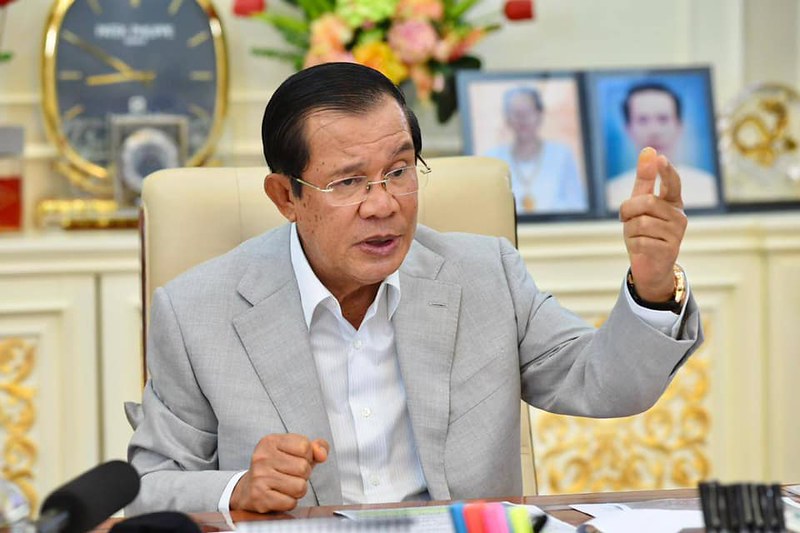Hun Sen's farce elections: Cambodians face vote without real alternatives
Sunday 23 9.7 million will go to the polls for a National Assembly totally aligned with the premier in government for 38 years. In the lists of the People's Party, 22.4% of the candidates are related to each other, while in recent months the repression against the banned opposition forces has intensified. However, the vote could open the transition of power to his eldest son Hun Manet.
Phnom Phen (AsiaNews) - Sunday 23 July 9.7 million Cambodians are called to the polls to elect the new National Assembly of 125 members. The choice is between candidates from 18 parties aligned with the official directives, united against the "outlawed" opposition forced into exile or prison.
With these premises, the Assembly will be "new" perhaps due to the presence of some less well-known faces, but it will certainly represent the umpteenth confirmation of a legislative power subservient to the interests of Prime Minister Hun Sen, in government for 38 years and his system of power based on intimidation, nepotism and corruption. Significantly, 22.4% of the 125 candidates of Hun Sen's Cambodian People's Party are related to each other.
The authoritarian drift was confirmed by the arrest on July 17 of four members of the Candlelight Party accused of having proposed to voters to cancel the ballot papers. While on the same day a ban from any public office for at least twenty years was issued for 17 personalities of the National Party for the Salvation of Cambodia (all in exile) including the leaders of the opposition political formation and former parliamentarians Sam Rainsy, Mu Sochua, Long Ry, Nuth Romdul, Hou Vann, Kong Saphea, Eng Chhai Eang. The ban was imposed by the Electoral Commission headed by a parliamentarian from the ruling Cambodian People's Party.
If the result is obvious, the electoral round presents two elements of interest. First of all, it is the second, after that of five years ago, to see the lack of any political contender, given the repression that has sent anyone who has shown hostility towards the government and its leader to prison, exile or house arrest.
Furthermore, the formation of the new Parliament could lead to a transition of power from Hun Sen to his eldest son Hun Manet, current commander of the Cambodian army, the only one so far indicated by his father to succeed him, but many question his real ability and determination to continue on his father's line.
On the other hand, the entire management by the former Khmer Rouge "cadre" in office since 1985 has been characterized by despotism and brutality towards critics but also towards anyone who sees in his corrupt and inefficient system a primary limit to the country's development.
Its natural and human resources, in fact, have only benefited the loyalists of the head of government and foreign interests, first of all the Chinese ones, to which little Cambodia, 181,035 square kilometers, is now inextricably linked.
Most of the 17 million Cambodians live in poverty with an average per capita income of less than ,700 a year, amidst enormous inequalities and few possibilities to seek justice. In recent years, the support of non-governmental organizations has also been limited by government interventions on the sources and use of funding, while the suspicion of the authorities has led to the closure of many of these activities.
The mass media that are not in favor of official policies have also been affected, starting with the best-known English-language newspaper, the historic Phnom Penh Post, "normalized" after its takeover by a Malaysian tycoon in 2018.
The opposition - the first target of Hun Sen's ax, but tenacious and supported by many in the international community - has suffered even more heavily from the repressive campaigns that have silenced even the main trade unions.
For years, the primary target of intimidation campaigns was the National Party for the Salvation of Cambodia founded by Sam Rainsy, an exile in France for many years, and banned in 2017.
Another opposition leader, Kem Sokha, a long-time activist and exponent of the same party, was sentenced on March 3 last to 27 years in home detention for "treason" for having - according to the indictment - conspired with foreign forces for subversive purposes. T
he occasion was provided by Sokha's meeting with the US secretary of state, Anthony Blinken, who during his visit to Cambodia had also expressed Washington's concern about the situation in the country to Hun Sen.
The path to Sunday's vote was marked by increasing violence and aggressive rhetoric directed at the few dissenting voices. In line with what was explicitly indicated by Hun Sen who in January on Facebook had indicated to opponents only two options: legal or physical repression. Adding later: “You are like fish in a barrel. I can snap your neck and eat you any time I want."
The promise was kept with a wave of attacks triggered by the murder of Sin Khon - a 29-year-old Cambodian Salvation Party activist last November - threats, arrests and detention without trial that have targeted hundreds of individuals accused of conspiring against the government or national security.
Photo: Flickr/Prachatai
06/06/2022 18:32







.png)










